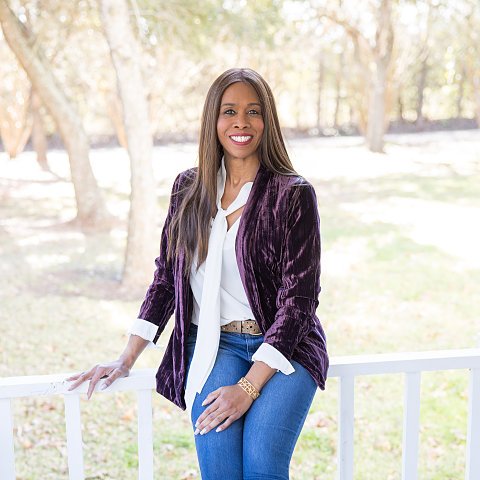
If COVID-19 has taught us anything so far, it’s that we are not in control. When life gets hard, aspects of the future are uncertain, and we’re at the mercy of other’s decisions, we want more power over the situation. However, those are precisely the times when we need to learn how to surrender, just like Jesus did.
Disclosure: Affiliate links are used in this post. If you choose to purchase through the links, I may be compensated at no additional cost to you. See full disclosure policy.
In Surrendered: Letting Go & Living Like Jesus, Barb Roose leads readers in a study of Jesus in the wilderness to show that when our need to fix things takes over, that’s when we need to embrace God’s plans rather than our own. Roose asks readers to consider if it is possible that giving up on what they can’t change is God’s path to peace for their life.
Interview with Barb Roose
Q: There may literally be no better time for this specific Bible study to release! Tell us about the theme of your new study, Surrendered.
In light of what our world is experiencing right now, I would totally agree! Who knew that toilet paper would become the hottest commodity in America? My new Surrendered study is written for the weary woman who needs to let go of control-loving behaviors and learn to live like Jesus in the midst of hard times or during heartbreaking circumstances that we all face at some point in life.
Q: Surrendered focuses on Jesus’s time in the wilderness. How do you use the wilderness as a metaphor for the reader? The wilderness is a spiritual symbol for those long, difficult and uncomfortable seasons in life. Wilderness seasons are frustrating because there are no quick fixes and we often have no control over how long it will last or ultimately, how that hard situation will turn out. Yet, the wilderness season is a beautiful invitation for us to experience God in new and powerful ways. As we travel through hard days or heartbreaking times, the wilderness is often a place where we experience God’s might power, abundant provision and comforting presence in ways that we never have before. Remember that both Jesus and the Israelites spent time in the wilderness. Jesus’ forty days model for us how to live by faith during his wilderness seasons while the Israelites forty years teach us valuable lessons on what can happen when we allow fear to overrun our hearts in hard times.
Q: We’re seeing a lot in the news about stockpiling due to future uncertainty. Let’s talk more about God providing what we need for today, and how you began practicing your “Principle of Daily Bread.” I believe that God takes care of His children at all times, especially hard times! When my adult children were young kids, I used to panic if I couldn’t immediately repurchase or replace something that broke or ran out. One of the ways that I used control to push back against the panic was to join the coupon craze. I’d spend hours each week clipping coupons or printing them. I’d haul home handfuls of free toiletries or snacks and store them in a closet that I called “my stockpile.” However, a season of life came when I couldn’t even afford the newspaper to clip the coupons. Eventually, my stockpile went away, and I hit a spiritual rock bottom. I began to reflect on Jesus’ words in Matthew 6:11, “give us this day our daily bread” and realized that I’d placed my faith in a stockpile, not in God. The “Principle of Daily Bread” means that I will trust that God will provide exactly what I need for the day in front of me. Like the Israelites had to wait for God to provide manna each day, I learned to wait for God to provide and stop letting the amount of food in my cupboard or the amount of money in my bank account, determine my level of peace or joy.
Stop letting the amount of food in your cupboard or the amount of money in your bank account, determine your level of peace or joy. @barbroose #surrenderedstudy Share on XQ: Why is it so hard to trust God to take care of us when he promises that is what he will do? I don’t know about anyone else, but I expect that God will do things like I would do them. So, when I’ve got a problem that I can’t fix, and then God either seems to delay or doesn’t seem to be doing anything about it, I get disappointed. I’ve learned that disappointment is often the doorway that leads to distrust. However, Isaiah 55 reminds us that God’s thoughts are higher than our thoughts and His ways are higher than our ways. So, in my experience, wilderness seasons have lasted a long time because it takes me a long time to let go of my expectations and learn to wait in anticipation.
Q: It’s not a sin to be tempted, so why do we feel so much shame and guilt because of our temptations, after all, Jesus was tempted? While it’s not a sin to be tempted, we’re often feel shame around the source of our temptation. Once we feel shame, silence and isolation quickly follow. Satan loves to show up in our spiritual isolation, but that’s when his lies stick the most. As long as we’re silent, we’ll struggle against Satan’s assault on our own—and that’s dangerous for us! However, Jesus showed us that we can find victory over temptation and avoid getting trapped in spiritual isolation by fighting back with Scripture and relying on the Holy Spirit.

Q: What are the steps to letting go of things we’re trying to control? Letting go or surrender is a prayer and a process. Rather than identify steps, I identify four questions in the “Letting Go Loop” that equip control-lovers to not only identify their control-loving behaviors but also identify God-honoring and life-giving next steps toward letting go and living like Jesus:
• Awareness – Am I trying to control others or outcomes right now?
• Arrest – What do I need to stop trying to protect, fix, or force to make happen?
• Acceptance – Where do I need to acknowledge the reality that I do not have control, but God can handle it?
• FaithFULL Action – How can I show love, kindness and wisdom without control-loving behaviors? As the questions are answered, the Letting Go Loop reveals where we need to open our hands and turn toward God instead of trying to fix or force the solutions for ourselves.
Find an anchor for your soul during these unsteady times through the new Surrendered Bible Study by @barbroose Share on XQ: What are some ways women can creatively come together to do the study as a group, even if they aren’t able to meet in person? While I hate the difficult circumstances that the COVID-19 outbreak has created around the world, but I love seeing how God dropped some opportunities in place before we realized that we needed them.
Here are a few wonderful opportunities that are available during these wild times:
One of the ways that I want to serve women in the midst of the virus crisis is to provide an online gathering for them to do the Surrendered study. So, I’m hosting the Surrendered Online Study beginning on April 22. I’ll be doing live teaching on Wednesdays in a private Facebook group and then, Thursdays will be our group discussion day. I’m excited about this because many women can’t meet with their groups, and I don’t want that delay to keep them from experiencing the Surrendered study. More information is available at barbroose.com/onlinestudy/.
Here are a few other ways that women can experience the Surrendered study:
1. AMPLIFY – To help groups stay connected and continue to study the Bible together during this time of social-distancing, Abingdon Women and Amplify Media are making the video sessions of Surrendered: Letting Go and Living Like Jesus available for free for group members to watch at home from any device. Sessions will be available free of charge from April 7 to June 30, 2020. View the video sessions, here. Amplify Media is a streaming service allowing churches large and small unlimited video access in order to discover, customize, and share diverse resources that encourage deeper discipleship and equip churches to pursue their mission with greater impact. Learn more at AmplifyMedia.com.
2. DIGITAL DOWNLOAD – Each individual session of the Surrendered study is available for digital download at Cokesbury.com.
3. ONLINE GROUPS – I’m so encouraged and inspired by women’s Bible study and small group leaders across the country who are so dedicated to leading their groups in these challenging times. I’m also a group leader at my church, too! Like many group leaders, our group is leveraging technology like Zoom, Facebook Groups and other platforms to meet together online.
Thank you, Barb, for sharing hope with us today, and for this great new resource!

Barb Roose is a popular speaker and author who is passionate about connecting women to one another and to God helping them apply the truths of God’s Word to the practical realities and challenges they face as women in today’s culture. Roose enjoys teaching and encouraging women at conferences and events across the country, as well as internationally. She is the host of the bi-monthly “Better Together” podcast. Roose lives in Toledo, Ohio, and is the proud mom of three adult daughters.
Visit Barb Roose’s online home at barbroose.com. Readers can also keep up with her on Facebook, Twitter, and Instagram.
Pick up a copy of Barb, Surrendered Bible Study.
You might also like:
Getting Things Done When Life Gets Out of Control (Interview with Barb and myself)
When You’re Waiting (Interview with Barb Roose on The Martha + Mary Show)
Barb’s Better Together Podcast

